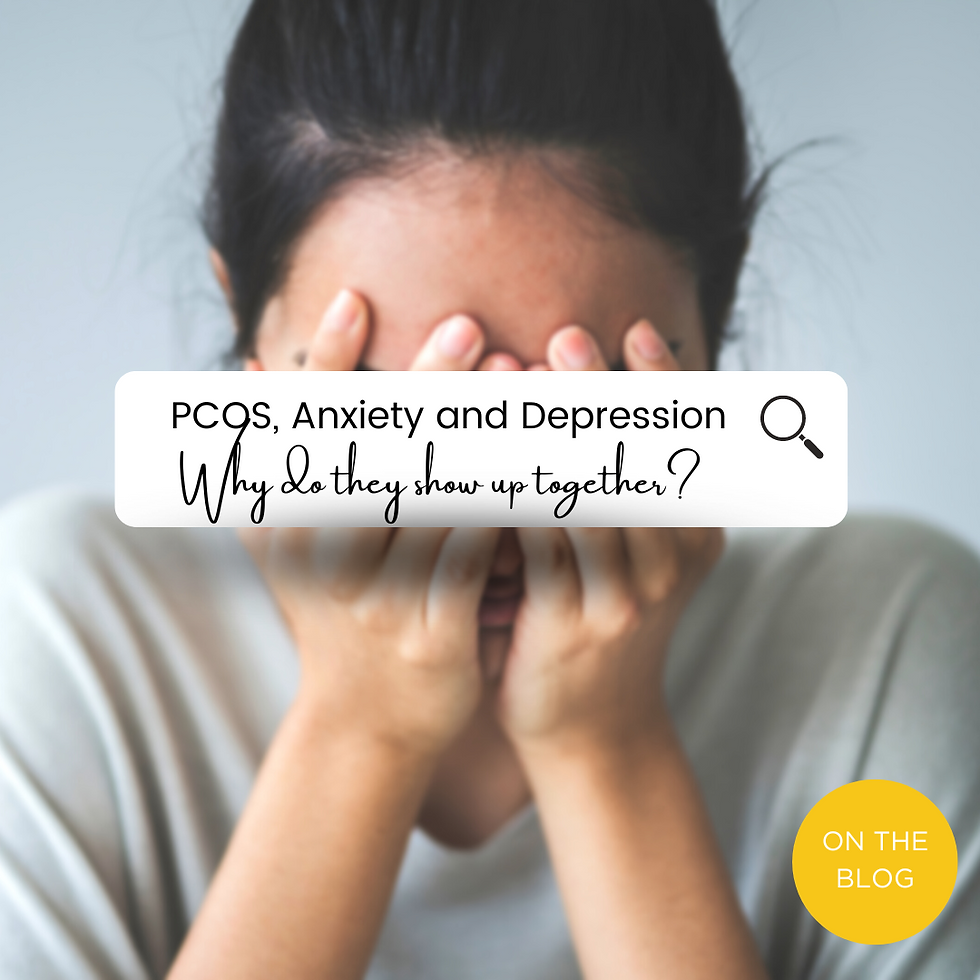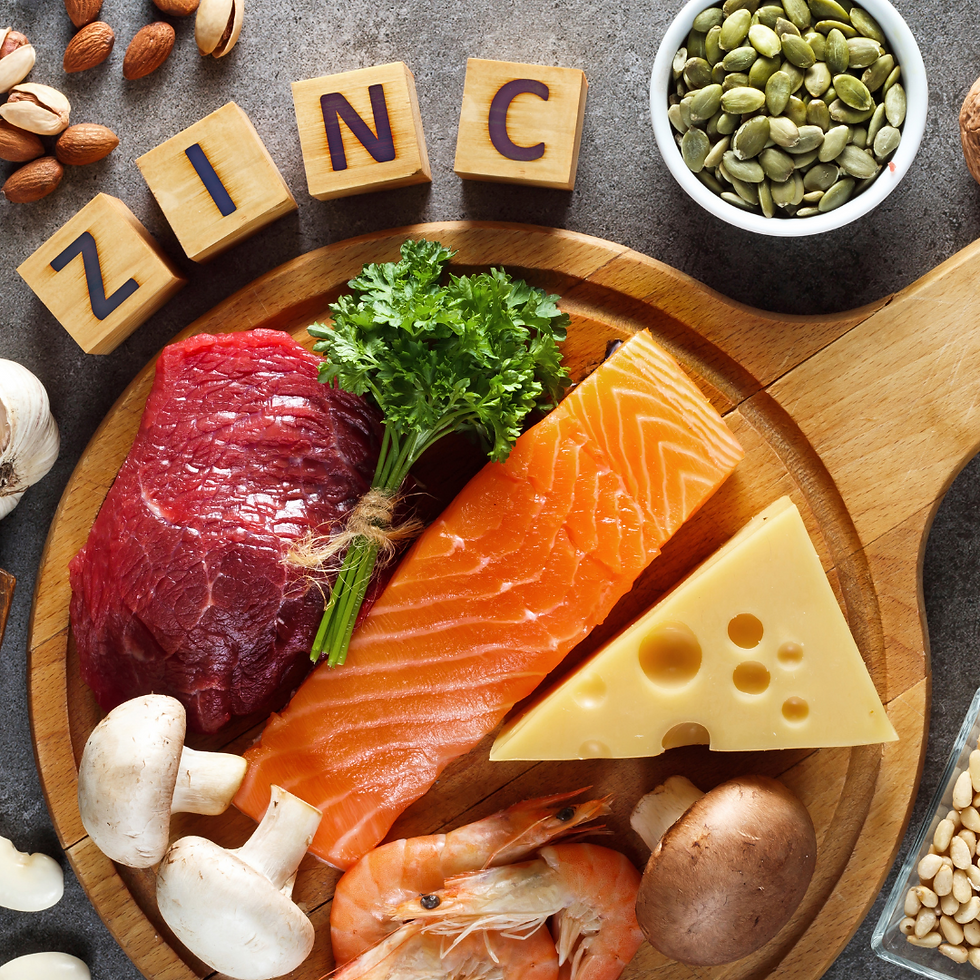PCOS, Depression and Anxiety - Is there a link?
- nicolebarber
- Mar 15, 2023
- 7 min read
While working as a dietitian, I have seen the practical prevalence of women diagnosed with PCOS also having anxiety or depression. An article published in 2009, reported that up to 64% of women diagnosed with PCOS are also suffering with depression (1)

To frame this statistic, about 5% of the general population have been diagnosed with depression (1). So 64% is just way too high of a number to just be a coincidence.
By reading this fact, create space in knowing, if you have been diagnosed with PCOS and you are experiencing anxiety and depression; you are not alone. The more we are learning about the multifactorial condition, the more we are realising how many systems within the body it affects.
So, what is PCOS? Polycystic ovary syndrome (PCOS) is the most common hormonal disorder in women of reproductive age. It affects about 8-13% of women – about 1 in 10.
In women diagnosed with PCOS, we know many experience changes in their levels of two key hormones – insulin and androgens. The imbalance can cause symptoms of - Irregular period cycles - Lack of ovulation - Acne and/or the darkening of the skin - Excess hair growth and or hair loss, balding - Weight gain - Anxiety and depression - Low body image - Multiple cysts on the ovaries - Sleep apnoea Why would Anxiety and Depression be linked? Early on, the assumption was that anxiety and depression had a high prevalence, as it was like a “side effect” from the PCOS symptoms. The very nature of having symptoms like acne, excessive hair growth, balding, difficulty with weight loss and infertility can have such a significant impact on a woman’s mental health, their identity and overall quality of life.
But recent studies are showing that there could be more to the story.
A 2009 cross sectional study, looking at 135 women with PCOS, compared various factors thought to influence a women’s mental health (1). These factors were martial and employment status, level of education, and, whether they had excessive hair growth, acne or were overweight, as well as their level of insulin resistance and testosterone (1).

What was interesting was that they found that women with these symptoms were no more likely to experience depression than those without the symptoms of PCOS (1). And there are more recent studies which have come to the same conclusion – people with PCOS still have an increased risk for anxiety and depression regardless of their weight, age, facial and body hair and fertility (2-4)
Looking deeper into PCOS
Many aspects of PCOS are still unknown, and that includes its cause. We do know however, that there are consistent metabolic changes within women diagnosed with PCOS. These are insulin resistance, elevated androgens, and chronic inflammation.
So, what do we know? Well, we know things like insulin resistance, inflammation, vitamin deficiencies, not getting enough sleep, stress and your gut health can all contribute to developing anxiety or depression. Let’s have a look at each one.
Insulin Resistance
Approximately 70% of women with PCOS are insulin resistant. Insulin resistance is where the bodies cells don’t take in glucose in the way that they should (5).
Stanford medicine scientists have linked insulin resistance to an increased risk of developing depression (6) They analysed data from 601 men and women, who at the time of enrolment had never been troubled by anxiety or depression; and found if the participant had insulin resistance, they were 89% more likely to develop depression (6).
Inflammation Inflammation is at the heart of most PCOS cases – with studies finding that most people with PCOS have higher levels of certain inflammatory markers when compared to people without PCOS (7)
Some inflammation is perfectly normal; but it is a bodies state that is only supposed to be turned on for brief periods of time. When it is constantly activated, causing chronic high cortisol levels, this is not ideal. Studies link high inflammation levels to increased prevalence of stress and depression as well as increased risk of insulin resistance (8)
Vitamin D deficiency Vitamin D levels are something I ask all my PCOS girls to have tested in their pathology reviews. For a long time, we have seen the prevalence of vitamin D deficiencies in those diagnosed with PCOS, yet we still really don’t know why this is the case.

Vitamin D is a hormone and every cell in our bodies have a vitamin D receptor. It becomes part of the hormonal puzzle of PCOS. What makes it an important piece of this puzzle is that it has been shown to have a powerful anti-inflammatory effect – and in turn a deficiency can contribute to chronic inflammation.
Published data has shown that women with PCOS and depression are more likely to have a vitamin D deficiency compared to those with depression alone (44% prevalence compared to 11% of women without PCOS) (9).
Iron deficiency Heavy Periods and/or diets low in iron rich foods can lead to an iron deficiency – this can impact on concentration, fatigue, and irritability; due to a lack of oxygen travelling around the body and to the brain.
An iron deficiency can also contribute to depression as it is required to make dopamine - a feel good hormone made in our brain. Low levels of dopamine have been linked to depression and anxiety.
One new research paper that I found by the University of Western Australia (UWA) (2021) found that about 17 % of women had been medicated for depression when they in fact had an iron deficiency. The misdiagnoses were often due to the symptoms being the same for both conditions:
leg cramps, restless legs at night
restless sleep; insomnia; waking up exhausted after 8=10 hours of sleep
fatigue; foggy brain; unable to think straight
when exercising; shortness of breath is being experienced more frequently
Sleep Sleep disturbances and disorders occur more frequently among women with PCOS compared to those without; and chronic sleep loss is a known contributing factor in developing depression (10).
Sleeping allows our body to repair, restore and reenergize. But when this is disrupted or inadequate, it can lead to side effects like poor memory and focus as well as mood changes. It can lead to fatigue – usually resulting in you having less energy to do the things that you once did, which can lead to a vicious cycle of fatigue and disturbed sleep causing both physical and mood related symptoms.
Stress Everybody experiences stress differently and these symptoms aren’t just mental – it can include things like fatigue, muscle pain, digestive troubles and restless sleep. Now, with anxiety the stress doesn’t just go away – even if there isn’t any stressor. Stress is a major risk factor for depression – which is concerning seeing that the incidence of stress in women with PCOS has been shown to be higher.
Stress can trigger the release of cytokines, which are small proteins that affect the body’s inflammation response (11). Stress can also increase our cortisol levels which is associated with depression (11) Gut Health You may have heard the term by now, “second brain”, as a way of referring to your “gut brain”. Don’t feel overwhelmed by all this “gut health/gut brain” information that is out there. The reason we are talking so much about gut health, is not because this is a new fad; but rather, quite the opposite. We now have the level of science and technology to see and study microbes at a level we never could. We now can see; study; and learn, that there is a clear link between gut microbes and mental health; inflammation markers; insulin resistance; weight; fertility; sickness and more.
The more diversity occurring in the gut bugs; the stronger health parameters can be for an individual. For those diagnosed with PCOS, we can know there is a reduction in gut microbe diversity and this trend appears to be linked to insulin resistance, elevated testosterone levels, anxiety and depression, hirsutism.
What can you do?
Mental health is a health condition which needs many “arms” of treatment. The most important part to treatment, is to know it’s not something you should manage yourself. So often, clients dismiss seeking treatment for their mental health, feeling ashamed. Please don’t. Your GP is the place to start. They can help with referrals to a psychologists and create Mental Health Care Plans for you if appropriate.
Psychologists Seeing a psychologist for help, as still a lot of shame stigma around it. Please flip it! Seeing a psychologist is one of the best things you can do to looking after your mental health. Think of seeing a psychologist like you would take your car to a mechanic service. Sometimes the service is for a “tune up”; sometimes its for a “break down”; sometimes its for “performance”. No matter the reason, a psychologist is key to giving us the tools to help process and manage our thoughts. Food The foods we eat can help to address the known contributors to anxiety and depression - your gut health, inflammation, insulin resistance and vitamin deficiencies. There is no one superfood that will save your health. The goal is to implement a dietary pattern of regular intakes of fruits and vegetables, wholegrains, lean proteins (especially oily fish and eggs), dairy/dairy alternatives and healthy fats (like avocado and extra virgin olive oil).
In saying this, there are some nutrients we want to focus on: Omega-3, zinc, vitamin D and iron. - Omega-3: Depression has been found to be less common in countries where people eat more fish, which is a rich source of omega-3. Marine omega-3 is the most optimal source. If not a fish eater, you can use plant sources of omega-3, but depending on your omega-3 index, supplementation may need to be considered. - Zinc has been found to reduce inflammation, inhibiting brain function and cognitive

performance. Foods that contain zinc include oysters, meat, fish, poultry, some breakfast cereals, beans, nuts, whole grains, eggs and dairy products.
- Vitamin D: the sunshine hormone. The sun is the best way to soak up some vitamin D; but also eating more eggs and oily fish can help support dietary vitamin D intakes. - Iron: It is best absorbed when vitamin C is around. Having meals like a Thai beef salad, Mexican mince, lentils, or salad are all great dishes to maximise your iron absorption.
Final Note..
Developing dietary changes takes time. We are not robots, and the way we eat is personal. We bring our own experiences, relationships, taste buds and habits to the table. This is why I no longer do just "one-off consultations" where you just get a black and white meal plan sheet. I work with you over 8 weeks; to find your foods; provide education on why certain foods are ideal to include more off and develop your relationship with food.
Find Out More: www.nicolebarber.com/restore
References
7. https://www.ncbi.nlm.nih.gov/pmc/articles/PMC7962967/

Comments